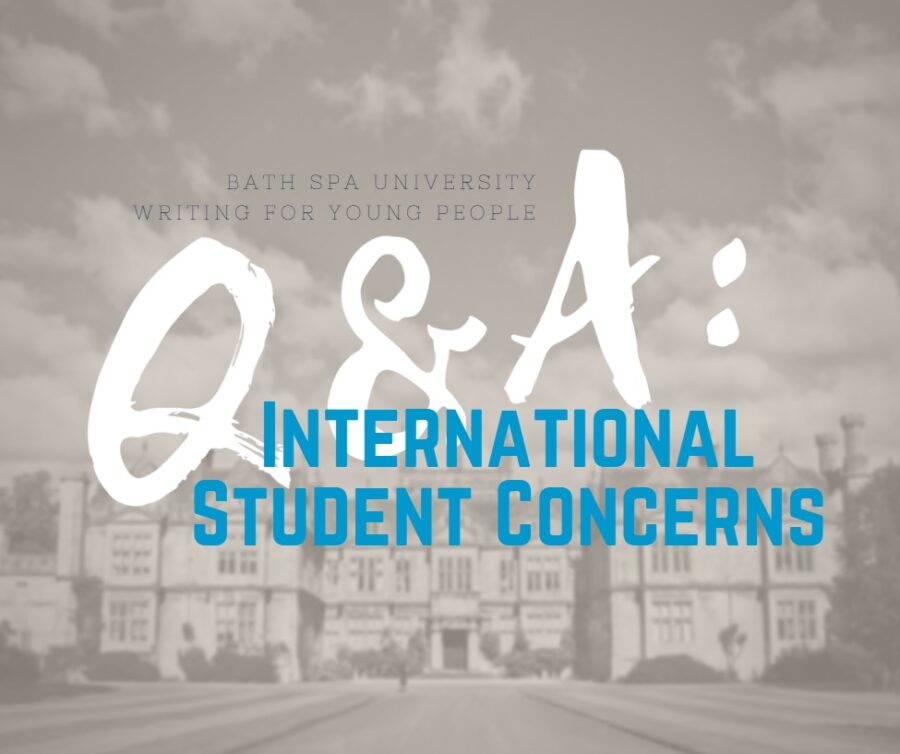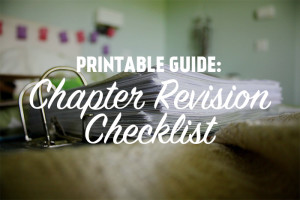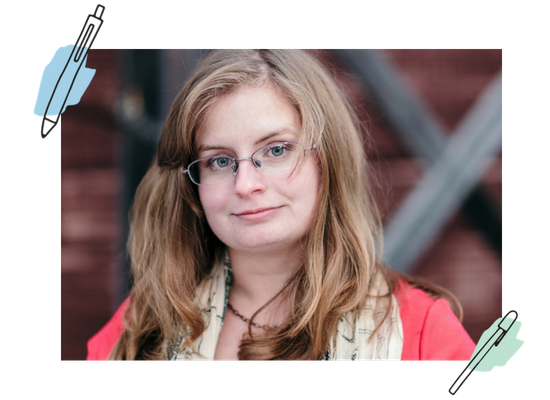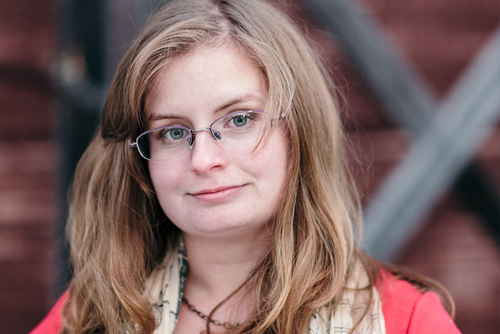It’s the fifth and final round of my Q&A session about Bath Spa University’s Master of Arts in Writing for Young People. This section is all about the international student angle. Though I’m approaching it as an American, it should be basically applicable to my Aussie and Indian and Canadian and [insert origin of choice] friends looking into the course.
You can see the rest of the series under the Q&A tag!
As always, feel free to reach out with more questions by contacting me at: alyssamhollingsworth [at] gmail [dot] com
A thousand disclaimers: I only have my experience of the Writing for Young People course to draw from (class of 2014). I’m not a member of staff and can never hope to be as informed as the infallible Julia Green. Everything is my own opinion and may or may not be influenced by my personal preferences, the amount of candy I’ve had today, or the number of likes my latest corgi video got on Facebook. Extra disclaimer: Please note the date of this post. Since 2016, a lot of faculty turnover and program changes have taken place. My experience may or may not reflect the MA as it is today.
Q&A – International Student Concerns:
1. Did you have a chance to travel much in the UK and/or Europe while you were there?
2. Another alumnus I spoke to said there was an international student coordinator who arranged trips to places like London or Oxford. Is that still going on?
3. Would it be a better idea to build in some extra time either before or after the course specifically for traveling?
4. Have you had a chance to go back and visit, besides for the anthology launch?
5. When you returned to the US, did you feel isolation in terms of trying to get established as a writer or find opportunities for further work or become part of a writing community after coming back home?
6. Did you feel at any disadvantage from not having done a program in the US?
7. Did you find that not doing a US program had an impact on you in terms of finding opportunities or connections over here? Have you felt like you have had sufficient connections or networks here, and/or in an international sense?
8. If you had not found your agent through the anthology launch, would you have felt confident in finding an agent on your own after the program?
9. Could you give me a rough estimate of what to budget for living expenses for a year in the UK?
10. How does the NHS work?
11. Scholarship and grant opportunities for US students?
1. Did you have a chance to travel much in the UK and/or Europe while you were there?
YES! I’m not saying this was the biggest perk, but it was definitely up there. I’ve seen more of England than many of my British friends. I also went on a “research trip” to Venice for about a week, and at different times to Germany, Ireland, France, and Scotland. Because you only have two class meetings a week, there’s a ton of flexibility for traveling.
2. Another alumnus I spoke to said there was an international student coordinator who arranged trips to places like London or Oxford. Is that still going on?
I think there is someone like that in the undergraduate side of things (which post-grads are welcome to participate in!). One of the girls on my course went to Paris with a BSU group. I personally didn’t participate in those, but I tend to prefer independent travel with a small group of friends than large group travel with a bunch of rowdy 18/19 year olds. #OldGrouch
It is incredibly easy to get to London or Oxford on your own. There’s a Megabus that runs to London every day super cheap, as well as National Express. The train is more expensive (unless you buy your tickets a few weeks in advance, or you take the 12:15 train, which tends to be about 9 quid) but also very easy.
3. Would it be a better idea to build in some extra time either before or after the course specifically for traveling?
I milked my student visa almost as long as it would go, but that’s partially because I love England so much and I didn’t want to leave! It also meant I spent about a month in Wales and extra time at a conference in London after graduating.
You’ll also get all of Easter break off (about a month in April) which can be used for a few weeks of travel (I did France and Cornwall).
So, it’s up to you to some extent. But I always like to pad my time if I can afford it.
4. Have you had a chance to go back and visit, besides for the anthology launch?
Aside from the anthology launch, I’ve gone back for graduation and to train this year’s anthology group. I’ll be back in England this December for a conference and (hopefully) a Christmas party with my literary agency. Then I’m back again in April for Sarah Driver’s book launch.
I’m not sure if I’ll get over to Bath for those things, but I’m making plans to see some of my tutors already!
5. When you returned to the US, did you feel isolation in terms of trying to get established as a writer or find opportunities for further work or become part of a writing community after coming back home?
I have kept my writing community from my workshop group (many of us chat daily on Facebook, and we Skype together about every other week for our own workshop). I am still working on figuring out how to connect in my physical community, partially because southern Virginia does not have as big a literary scene as some other places! But I can honestly say I have never felt isolated as a writer since coming off the course — something I could hardly dream of before I went.
As far as work and post-graduation direction: I know this is annoying, but it depends very heavily on what you want to do with your life/degree. I wanted to get my degree as a way to really focus on my writing, but I was never really keen to teach. As I think I mentioned before, I do feel like the degree helped open doors in the freelance world.
In normal life, I work as an administrative assistant at a college — fairly low-key and not that glamorous, but something that pays decent and lets me preserve my energy. My supervisor is also awed by my experience abroad and loves spending literal hours picking my brain about the course and the industry!
6. Did you feel at any disadvantage from not having done a program in the US?
The only disadvantage might be that I didn’t get experience teaching during my BSU course. (Which might have been my own fault — I think there is some sort of community opportunity, and there might be other options I could have found if I had asked more and looked harder.) This means that if I wanted to teach at a college level, I really can’t in the US.
However, I also never really wanted to teach, so it hasn’t been something terribly bothersome to me.
7. Did you find that not doing a US program had an impact on you in terms of finding opportunities or connections over here? Have you felt like you have had sufficient connections or networks here, and/or in an international sense?
I don’t think it had a negative impact? It’s hard to say, because the connections and networks I made don’t necessarily have geographical barriers.
So, for instance, I didn’t come out of the course with an editor in my backpocket and a TV rights specialist on speed dial. But I came out of it with a score of tutors who will jump to answer any questions I have (even after graduation), a group of writer friends who are fabulous, a working knowledge of the industry (internationally), and a collection of authors in the alumni and among the speakers I met who I’m sure I could reach out to if I had need.
8. If you had not found your agent through the anthology launch, would you have felt confident in finding an agent on your own after the program?
I actually started querying a book (not my BSU manuscript — it’s complicated) in the US before the launch. I gained some traction, and had several interested parties who simply stepped back when they heard I had had other offers.
Based off of that and other indications, I feel confident I could have found an agent after the program. However, I know my work wouldn’t be as good without Amber. 🙂
Full disclosure: Not everyone in the course comes out of it with an agent, even in the year or two following graduation. It’s the same across the board, whether you’re a UK resident or a US student. It’s just individual and in some ways unpredictable.
9. Could you give me a rough estimate of what to budget for living expenses for a year in the UK?
My rent was £750 a month for a single bedroom/studio flat on the outskirts of Bath. That number will depend greatly on what sort of deals you find, if you get a roommate, and if you’re in Bath or Corsham (Bath is very expensive). I’m broadly estimating, but I think I budgeted monthly for about £50 in transport, £100-£150 in groceries, and £100 in eating out/entertainment in town. Rounding it all up to cover my memory gaps and extra costs, it was probably around £1100/month, so £13,200 for the year.
If that sounds super terrifying, keep in mind that the living costs are actually better in the UK than the US – small jobs pay more, etc. I made about £2500 from my one month of work in July. Also, there are money-saving practices I discovered and that other students used. I had one friend (an undergrad) at BSU who refused to ever spend more than £10 on his groceries for the week, and he was able to make it work! There are also bus passes and train passes that can reduce costs.
I’ve asked my other American friends to comment with their rough budget estimates, to hopefully give a more rounded sample!
10. How does the NHS work?
Once you’re there, mostly everything will be covered. You’ll need to register yourself at the doctor’s office in your community, but that doesn’t take much time. Seeing a doctor (even a specialist) will be free (though you may have to wait longer for your appointment, and you will have to arrange your schedule around the appointment times they give you). Prescriptions aren’t always free but they aren’t expensive (I think I got my thyroid medication for £3? And they were super nice about making sure I had what I needed if I was about to leave on a trip). This comparison of US/UK healthcare is pretty accurate to my experiences.
In addition, I saw an osteopath while I was there. I paid her £30 a session, I believe, so that wasn’t covered. I didn’t do official counseling while I was there, partially because I was being mentored by one of my church’s vicars (which gave me an opportunity to process and adjust), so I’m not sure how that applies.
11. Scholarship and grant opportunities for US students?
There is sadly not a whole lot of funding out there. I think I applied for a Rheumatoid Arthritis scholarship (which isn’t widely applicable—but if you have a weird disease there may be something for it!). I also used my dad’s GI Bill and MOAA loan (military perks).
I was given a small scholarship from BSU itself, but to this day I don’t know why. There is a BSU international scholarship, too, I think — it should be on the website.
The big scholarship I applied for was the Jack Kent Cooke Foundation Graduate scholarship. The application process was quite intense, if I remember correctly, and it’s incredibly competitive.
And that’s a wrap! Thanks for bearing with. Feel free to leave a comment with a question about the international concerns (or, if you’re an alumnus, dispute my claims!).

















